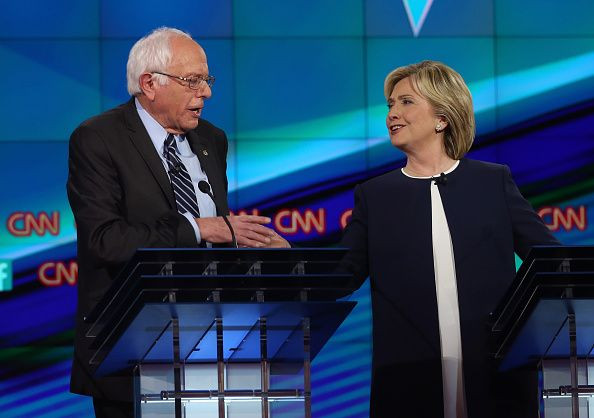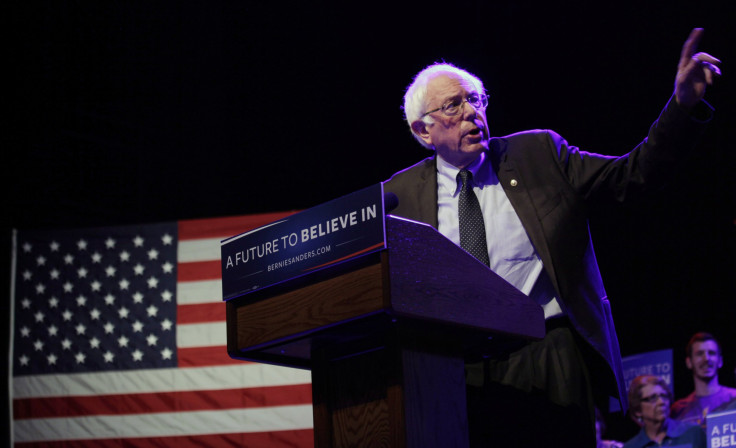Election 2016 Update: Bernie Sanders, Hillary Clinton Still Can’t Agree On Date For New York Debate

There’s being annoyed, and then there’s being endangered — and Hillary Clinton’s campaign for the Democratic presidential nomination may be both.
The former secretary of state complained Saturday rival Bernie Sanders was making it difficult for the pair to debate before the New York primary April 19 as polls indicated she was losing her commanding lead over the Vermont senator among nonwhite voters.
Clinton had proposed the pair face off Monday night, the night of April 14 or the morning of April 15, possibly on ABC’s “Good Morning America.”
Clinton press secretary Brian Fallon said Monday was rejected — it’s the night of the NCAA finals.
“The Sanders campaign needs to stop with the games,” Fallon said in a statement.
“The Sanders campaign needs to stop using the New York primary as a playground for political games and negative attacks against Hillary Clinton. … Sen. Sanders and his team should stop the delays and accept a debate on April 14 or the morning of April 15.”
The Sanders campaign noted it too had made proposals for debates that the Clinton campaign had rejected.
“We are very pleased that Secretary Clinton finally has accepted our request for a debate about the needs of New York and America,” Sanders spokesman Michael Briggs said in a statement. “Unfortunately, the dates and venues she has proposed don’t make a whole lot of sense. The idea that they want a debate in New York on a night of the NCAA finals — with Syracuse in the tournament no less — is ludicrous.”

New York is a critical state for both candidates, each of whom can claim native-son status: Clinton represented New York in the Senate; Sanders was born and grew up in Brooklyn. The state has 291 Democratic delegates, 247 of whom will be awarded based on the popular vote in each of the state’s 27 congressional districts. The other 44 are superdelegates — 21 controlled by the Democratic National Committee, 20 controlled by Congress, two by party leaders and one by the governor.
The set-to comes as the two campaigns exchange charges over whether Clinton not only accepted donations from individuals working in the fossil fuel industry but from lobbyists as well.
“If you include money given to super-PACs backing Clinton, the fossil fuel industry has given more than $4.5 million in support of Clinton’s bid,” Sanders campaign manager Jeff Weaver said in a statement Friday.
“If the Clinton campaign wants to argue that industry lobbyists giving thousands of dollars to her campaign won’t affect her decisions if she’s elected, that’s fine. But to call us liars for pointing out basic facts about the secretary’s fundraising is deeply cynical and very disappointing.”
Sanders has been gaining traction for a month, scoring more delegates than had been projected in Kansas, Nebraska, Maine, Michigan, Illinois, Missouri, Idaho, Utah, Alaska, Hawaii, Washington and among Democrats abroad, the Huffington Post reported, although Clinton maintains an edge. Polls also indicate he’s picking up support among nonwhite voters, long the bastion of the Clinton campaign.
On paper, Clinton has a commanding lead on Sanders en route to the 2,042 delegates needed for the Democratic presidential nomination, 1,712 delegates to Sanders’ 1,011. But most of her strength came in the South, and if superdelegates are taken out of the mix since they can change sides at will, she is only 263 delegates ahead of Sanders. With the next batch of primaries concentrated in the North and West, Sanders has a good chance of chipping away at Clinton’s lead.
The next test is Tuesday in Wisconsin, where the latest polls give Sanders a 1-2 point edge. The state’s 86 pledged delegates are awarded proportionally based on district levels for candidates who achieve 15 percent of the vote. There also are 10 unpledged superdelegates.
© Copyright IBTimes 2025. All rights reserved.





















